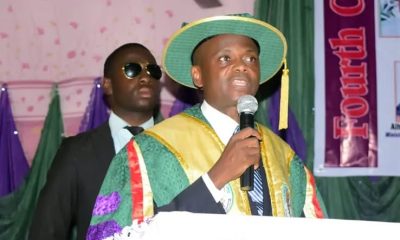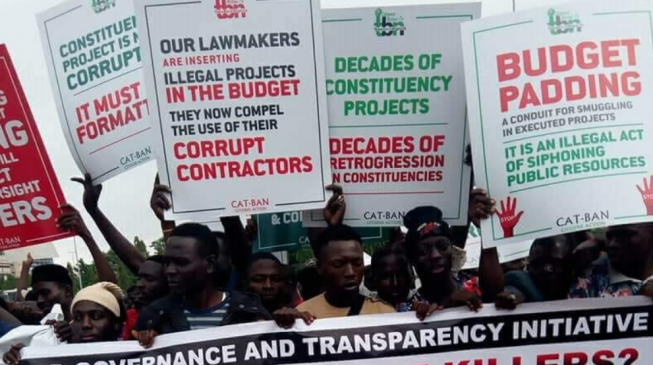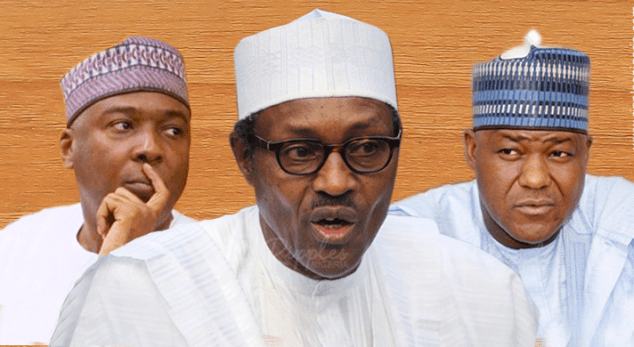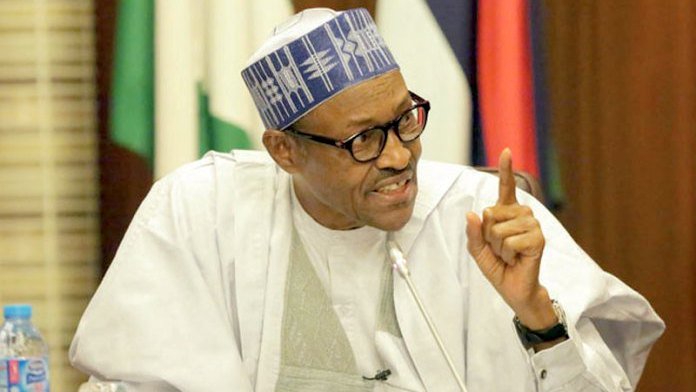Comments and Issues
Budget 2018: Issues for advocacy
Published
8 years agoon
By
Olu Emmanuel
By Otive Igbuzor, PhD
It has been recognised that the budget is perhaps the most important instrument for the development of any modern state apart from the constitution. It can be argued that it is only through the instrumentality of the budget that government can allocate resources to deliver services to the people especially the poor and excluded. But in Nigeria, there are a lot of blockages to effective budgeting. These blockages include lack of participation of citizens in the budget process especially in identifying projects that should go into the budget and effectively tracking the implementation; lack of access to budget documents and regular report by government; inadequate auditing and oversight by relevant bodies; poor linkage between plans and budgets and a lot of frivolous expenditure that cannot stand any reason.
Since return to civil rule in 1999, citizens groups have engaged in advocacy to address some of these challenges. The advocacy issues have centred around the need for increased allocation to infrastructure, agriculture, health and education; the need to remove frivolous expenditure that defies logic and reasoning; improvement of citizens participation in the budgetary process, the need to monitor the implementation of the budget and effective legislative oversight. Specific advocacy issues have included advocacy for reduction of recurrent expenditure, budget realism, more citizen participation, effective legislative oversight, effective auditing from the office of Auditor General, more allocation to the social sectors, effective implementation of the budget, reduction of frivolous expenditure and reduction of service wide votes to international acceptable standards of between 3 and 10 percent.
Over the years, the recurrent expenditure has been increasing disproportionately. For instance, Federal Government expenditure increased from 701.1 billion naira to 4.2 trillion naira between 2000 and 2012. But there was a higher level of increase in the recurrent expenditure (seven-fold increase) than the capital expenditure (four-fold increase). The increase is so much that for the past few years, recurrent expenditure has been over 70 percent of the total budget. In the past, scholars have consistently criticized the budget for not being realistic. The macroeconomic assumptions are always too optimistic and seem unrealistic. The crude oil projections are always more than the OPEC target including the target of 2018. Although there is a slight improvement in citizens participation in the budget process, citizens make little or no input on projects that go into the budget. In addition, citizens lack the skills and resources to effectively monitor the entire budget cycle. The oversight from citizens groups, media and legislators is still weak and lacks systematic approach. The Office of the Auditor General needs strengthening to improve its independence and performance. Allocation to the social sectors is still very low even when compared to other counties. There are still frivolous expenditure in the budget. The percentage of service wide votes continue to increase beyond the international benchmark.
It must be recognized that despite the challenges mentioned above, previous efforts have yielded some gains in the budgetary process. There is clearly an improved engagement by citizens in the budgetary process. Discussions about the budget take place almost on a daily basis in the social media, newspapers, radio and television. Several citizens groups such as BudgIT, Centre for Social Justice, Follow the Money, CODE, African Centre for Leadership, Strategy & Development, NBEBUMOG, etc are tracking the budget. The Budget Office of the Federation has produced a simplified budget that citizens can engage with.
The government has also set up the Citizens Budget Portal containing relevant budget information. On the citizens portal is an application that citizens can use to monitor projects and report. Citizens groups working with relevant committees of the National Assembly have developed tracking template that citizens groups can use to track the budget and the report used by the National Assembly for oversight. Citizens groups and the media are now more systematic in engaging the budget process. Several media platforms now have programmes dedicated to budget issues. In addition, there are marginal increases in allocation to the social sectors. For instance, allocation to education increased from 6.12 percent in 2017 budget to 7.03 percent in the 2018 proposed budget. However, despite the gains from previous advocacy, there are still issues with the 2018 budget especially with the process of making the budget and the content of the budget.
ALSO SEE: Buhari’s 2018 budget by default
The 2018 budget is based on an Oil benchmark crude oil price of US$45 per barrel; an oil production estimate of 2.3 million barrels per day; and an average exchange rate of N305 to the US dollar; and target Gross Domestic Product (GDP) growth rate of 3.5 per cent.
First and foremost, there are still issues with the process of making the 2018 budget.
Citizens and communities do not participate in the selection of projects that go into the budget. Legislators are not consulted on the selection of projects into the budget. The oversight of the budget process by the legislature, civil society and the media is still weak. The Public Accounts Committee which was very popular in the second republic has become very ineffective. There is still confusion on the limits of legislative power in appropriation.
Secondly, there is no much improvement in the content of the budget. There is still low budgetary allocation to sectors that will have impact on the lives of citizens such as Agriculture, health, education and infrastructure. For instance, while the budgetary allocation to education by Republic of Benin and Ethiopia is more that 20 percent of the total budget since 2012, that of Nigeria is less than 10 percent. In the 2018 budget, the allocation to education is 7.03 percent. It is very clear that allocation to education is very low in Nigeria especially when compared to other African countries: Burundi -16.59 % in 2010; 14.98 % in 2011; 16.43 % in 2012 and 17.24 % in 2013; Benin-25.02 % in 2012; 22.34 % in 2013; and 22.23 in 2014; Ethiopia 26.30 % in 2010; 29.67 % in 2011; 30.54 % in 2012 and 27.02 in 2013; and Madagascar- 19.78 % in 2011; 20.33 % in 2012 and 13.99% in 2013.
Frivolous, inappropriate, unclear and wasteful estimates have continued in the 2018 budget. The Centre for Social Justice has documented that this amounted to two hundred and nineteen billion, three hundred and seventy million, two hundred and seventy-two thousand seven hundred and thirty-three naira, forty kobo (N219, 370,272,739.40) in the 2018 proposed budget. These include items such as over one billion (N1,144,066,298) for fumigation of the office of the National Security Adviser; N2.2 billion for Social Media Mining Suite for Directorate of State Security; over N907 million for replacement of vehicles spares and tyres in the Presidential CVU; over N4 billion for annual routine maintenance of mechanical/electrical installations of the Villa and over N254 million for procurement of anti-terrorism, chemical, bioradiation and nuclear weapon equipment by National Security and Civil Defence Commission.
Thirdly, there has always been issue with budget realism. In the past three years, the exchange rate has been fixed around N305 to the US dollar. This is very far from reality.
Even the oil revenue is projected at 2.3 million barrels per day. There is a large variance between projected parameters and actual results. For instance, the OPEC quota to Nigeria is 1.9 million barrels per day but 2018 proposed budget is 2.3 million barrels per day.
Fourthly, geographical analysis of the budget indicates that there is no systematic way to ensure fairness and equity e.g. 84 % of specialised and focused projects in the Ministry of Agriculture goes to Yobe State; for road projects-SW (21.4%); SS (19.17%); NC (17.76%);SE (15.96%);NW (14.69%) NE (11.27%); Power generation NW(16%); NE (47%); NC (35%); SS (2%); SW (0%); SE (0%). Power Transmission: SW (26%); SS (15%); SE (19%); NC (5%); NE (9%) and NW(26%). Aviation Capital budget: SW (12%); SS (8%); SE (9%); NW(26%); NE(1%); NC(44%); Railway counterpart fund (SE (16%); SS (5%); NC (13%); NE (14%); NW (47%); Inland Waterways and Maritime Capital Budget: SW (21%); NC (17%); NE (0%); NW (3%); SE (9%); SS (50%).
In addition, recurrent expenditure continues to increase when efforts should be made to decrease it. In the 2018 proposed budget, there is an increase by 11.38 percent over the 2017 approved allocation. Furthermore, although there is a slight improvement in the terms of early submission of the budget by the Executive to the National Assembly, it is still not in tandem with the Fiscal Responsibility Act and the Budget may not be passed even in the First quarter of 2018.
Another huge issue with the 2018 budget is service wide votes. Service Wide Votes became part of the budgetary process in Nigeria from 2003 to 2007. It was actually introduced to improve budget credibility and enhance fiscal discipline. Service Wide Votes is made up of unallocated funds set aside to meet genuine budget details of which cannot be ascertained at the time of making the budget because of sudden escalation of prices, contract variation, natural disasters, etc The international good practice in budgeting is to set aside unallocated amounts for unforeseeable or indeterminate expenditure at the time of budgeting. But to promote transparency and accountability, it is recommended that
“Contingency Budget” or service wide votes should be between 3 and 10 percent of the original budget. But service wide votes have increased steadily in Nigeria. In the 2018 proposed budget, it increasedfrom 31.7 percent in 2017 to 36 percent of the 2018 proposed budget.
The budget is crucial in allocating resources and delivering services to citizens. But there are a lot of blockages to the budgetary process in Nigeria. Previous advocacy efforts have led to some improvement, but a lot still needs to be done especially in terms of process, content and implementation issues. There is the need to promote citizens engagement in the entire budget cycle from selection of projects through implementation to monitoring and evaluation. There is the need to promote budget literacy and enhance social, economic and political resilience. Citizens groups need to work more closely with the legislature and the media to ensure effective tracking, monitoring and oversight.
Dr Otive Igbuzor is a policy Analyst and strategist
E-mail:[email protected]
Continue Reading
You may like
Click to comment
Trending

 Latest3 days ago
Latest3 days agoYoruba film industry mourns as popular actress aunty Ajara passes away

 Trends4 days ago
Trends4 days agoTonto Dikeh reunites son with Churchill after decade-long split

 Education1 week ago
Education1 week agoAchievers University expels 15 female students over indiscipline

 Business6 days ago
Business6 days agoRite Foods positions industry as catalyst for Nigeria’s clean energy transition

 Football6 days ago
Football6 days agoArsenal’s Osman Kamara completes permanent move to Blackburn Rovers

 Featured6 days ago
Featured6 days agoMidnight raids, teargas: Lagos deploys military-era tactics in mass evictions

 Health5 days ago
Health5 days agoControversial preprint revives vaccine–autism debate, draws sharp pushback from medical experts

 Featured1 week ago
Featured1 week agoEPL: Palmer fit for Chelsea’s match against West Ham – Rosenior







